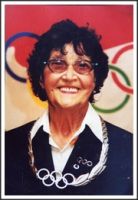Maria Kwasniewska-Maleszewska
»I live not for myself, but for others«
Maria Kwaśniewska
Why do I consider this woman to be an important person?
Maria Kwaśniewska was an Olympic medalist in the javelin throw (Berlin 1936) and the Olympic Movement activist. During the war, her apartment was a harbor for people whom she pulled out from the German transit camp in Pruszkow. After World War II she began to work for the Polish and the international Olympic movement (from 1949 until her death). As the first Polish woman she received a Bronze Medal of the Olympic Order (1978), and 20 years later - Gold. Accepting it she was 87 years old. She did a lot for the women's sports in Poland, for 22 years she worked in the women's committee of the International Amateur Athletic Federation (IAAF). As one of the few she always defended Ewa Kłobukowska - a great sprinter and Olympic gold medalist, who was forced to prematurely abandon the sport. Due to the denunciation of the German Democratic Republic’s and the Soviet activists she was forced to take gender tests (study of chromosomes). It was only in 2002, that the IOC wrote in a statement that tests the mid-60s were unreliable.
Biography
She was born in Lodz in 1913. She graduated from a humanistic high school. Sports began to train sports at the age of 14 years. She was one of the top athletes in team sports: volleyball, basketball and hazena (then-popular version of handball), she also long jumped, pushed the ball, and took part in triathlon and pentathlon. But most of all she threw the javelin. She was the first Pole, who overcame the limit of 40 meters in the javelin, a total of 10 times she improved the national record. At the Olympic Games in Berlin, she won a bronze medal, and for the result (41.80)... Adolf Hitler himself congratulated her (the picture with the leader many times was useful during the German occupation).
Maria Kwaśniewska was married three times. After the death of the first two husbands, after the war she married Wladyslaw Maleszewski - a basketball player and an outstanding coach. She was with him until his death in 1983 and they had two children, none of them were interested in the sport.
Her growing sport career was interrupted by the outbreak of the war, and she was only 26 years old. After 1945, she briefly resumed training and also got engaged in activities for the Polish and the international Olympic movement. She had the longest history in the Polish Olympic Committee: she was a member of all boards from 1949 until her death. Those who worked with her claim that she was very impressive in taking care of other people’s matters. Thanks to Kwaśniewska Richard Parulski founded the foundation for former athletes Gloria Victis, it also forced the need to pay Olympians special pensions. She thought that „they used to win medals for Poland, so now Poland should help them.”
She was a recipient of the Centennial Award IOC Sport and Ecce Homo as an advocate for the disabled. In 2002, she received the Award of Merit - the highest award of the Association of National Olympic Committees. She also had a medal Kalos Kagatos-athletes awarded to sportsmen for activities outside sports (a reference to the ancient ideal of combining beauty - kalos and good - kagathos).
In 2005, for outstanding contribution to Polish sport and the Olympic movement she was awarded the Commander's Cross with Star of the Order of Polonia Restituta. In this way she was honored as the founder of the Central Olympian Club connected with the Olympic Committee (1963), Polish Olympian Club in London (1967) and field clubs.
It was written about her in glowing terms: friendly, sacrificing for others, helping everyone who needed help. She often said: „You live not for yourself but for others.” She was singled out and appreciated, but was known mostly in sports environment. I think its worth to make her achievements known to other people.
Bibliography
- „100 lat ŁKS. Dzieje klubu 1908-2008”, wydawnictwo GA Katowice, 2008
- Stefan Sieniarski: „Brawo, Maryśka” w: „Poczet polskich olimpijczyków 1924-1984”
Link
- http://www.pbi.edu.pl/book_reader.php?p=27220(available 11.03.2013)
Picture source:
Photo is owned by the Museum of Sport and Tourism ( Department of the Museum of the City of Lodz)
Rights; The consent to place photo on the website www.unless-women.eu issued by the museum




